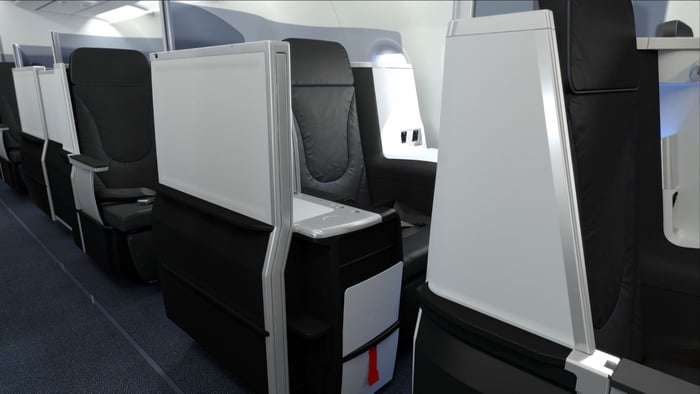For three years, JetBlue Airways (JBLU -3.35%) has been publicly weighing the possibility of flying to Europe. In mid-2016, it negotiated an option to convert some of its Airbus A321neo orders to the A321LR variant, which has additional fuel capacity, enabling flights between the Northeast U.S. and Western Europe.
On Wednesday, JetBlue made the long-anticipated announcement that it will exercise some of those conversion options, allowing it to begin flying from Boston and New York to London in 2021. Other popular destinations in Europe, such as Amsterdam, Dublin, and Paris, could follow soon thereafter.
JetBlue sees plenty of potential in Europe
A big reason why JetBlue is expanding to Europe -- and London, in particular -- is because many of its customers already travel there and would fly JetBlue if they had the choice. Corporate customers, in particular, have been clamoring for JetBlue flights to Europe.

JetBlue confirmed last week that it plans to start flying to London in 2021. Image source: JetBlue Airways.
Indeed, by late 2016, JetBlue already served 39 of the top 50 destinations from Boston. (It has since added another: Minneapolis-St. Paul.) At the time, management noted that four of the 11 top destinations that JetBlue didn't serve yet from Boston were in Europe: London, Paris, Dublin, and Reykjavik. Of those, London is by far the most popular travel destination.
The biggest opportunity for JetBlue is in the upper end of the market. Outside of peak season, economy fares for transatlantic flights are pretty low, as budget carriers like Norwegian Air have injected more competition into the market.
By contrast, business travelers who want flat-bed seats for long-haul flights have few choices in the transatlantic market. American Airlines (AAL 0.73%), Delta Air Lines (DAL -0.41%), and United Continental and their European joint-venture partners are absolutely dominant on many key transatlantic routes, leading to extremely high premium fares.
In the past five years, JetBlue has had huge success with its flat-bed "Mint" premium service on domestic transcontinental routes, combining an award-winning inflight product with lower fares to stimulate demand. Mint should allow the carrier to compete effectively for premium traffic on transatlantic routes, as well. Furthermore, JetBlue will take advantage of the new Airbus Cabin Flex option to offer more Mint seats on each A321LR than it does on its current A321 Mint fleet.

JetBlue's Mint lie-flat seats are the linchpin of its business plan for London flights. Image source: JetBlue Airways.
Two alliances dominate the U.S.-London market today
Fares for flat-bed seats on routes to London tend to be particularly outrageous. That's largely because the market is dominated by two key joint ventures: one between American Airlines and British Airways and another between Delta Air Lines and Virgin Atlantic. Each joint venture has antitrust immunity, allowing the members to plan schedules and pricing together while sharing revenue on routes between the U.S. and London.
On a typical day this summer, there will be 33 nonstop flights from New York to London. Nearly half of those (16, to be exact) are operated by the British Airways-American Airlines joint venture. The Delta-Virgin Atlantic alliance accounts for another nine. United and Norwegian are the only other competitors, with five and three daily roundtrips, respectively.
The situation is even worse in Boston, where there are eight daily flights to London: four by British Airways and three by the Delta-Virgin Atlantic joint venture. Norwegian supplies the only competition to these two behemoths, with a single daily flight. Moreover, with no flat-bed seats, Norwegian doesn't compete in the premium segment of the market.
As a result, roundtrip business class tickets from Boston or New York to London routinely price out at $8,000 or more, even if purchased a month in advance. By contrast, roundtrip business class fares between New York and Madrid (a market with more robust competition) can be had for around $3,000, even though it's a slightly longer flight.
This highlights the opportunity for JetBlue -- and for travelers willing to pay up for comfort. The carrier could probably set the starting price for Mint tickets on its London routes at $3,000 or less roundtrip and still earn sizable profits.
Getting into the best airports will be critical
JetBlue hasn't set schedules yet for its London flights. It hasn't even determined which London airport (or airports) it will use. All the airline revealed in its announcement was that it plans to offer multiple daily flights to London from both Boston and New York.
Gaining access to the most preferred London airports could make or break JetBlue's expansion plan. Heathrow Airport -- the city's primary airport -- is completely full, and slots trade for tens of millions of dollars each (on the rare occasions that they become available). The situation isn't much better at Gatwick Airport.
JetBlue executives have hinted that they expect to gain access to at least one of the two airports, if not both. The pending acquisition of Flybe by a consortium including Virgin Atlantic could lead to mandatory slot divestitures at Heathrow. JetBlue also argues that it should be given "remedy" slots currently allocated to Delta and Virgin Atlantic to bolster competition on certain U.S.-Heathrow routes. Finally, if Brexit becomes a reality, the top antitrust regulator in the U.K. plans to open an investigation into Heathrow slot allocations.
Still, there's no guarantee that JetBlue will be able to get attractive slots -- or any at all. If it's forced to use less-convenient airports like London Stansted, many business travelers might stick with American and Delta (and their joint-venture partners), despite their higher fares.
The battle between JetBlue and the incumbents in the New York-London and Boston-London markets looks like it's going to be epic. Investors and travelers will just have to wait and see how JetBlue implements its London plans.





